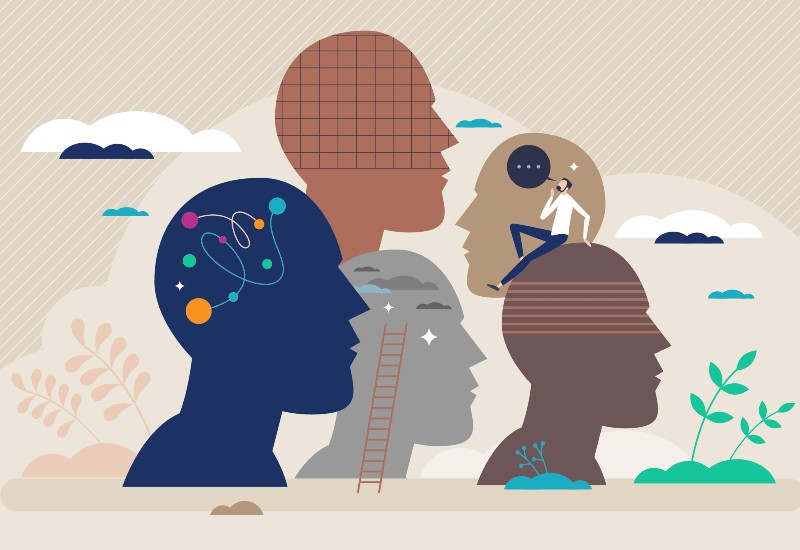April is Autism Awareness Month, and April 2nd is World Autism Acceptance Day. As awareness of neurodiversity grows, there is a growing need for healthcare providers like us to offer affirming care for autistic individuals. And, as we’ve described before, at Galen Hope, affirming care is central to everything we do. That’s why we prefer the idea of autism acceptance to just simple awareness.
A big part of the reason we like “autism acceptance” is that “autism awareness” is not a favorable term in much of the autistic community. Many autistic people and autistic advocacy groups point out the the idea of “autism awareness day” was was created by groups that have traditionally viewed autism and a negative or disordered condition that needs to be “fixed” or corrected.
“Acceptance is about moving beyond this idea of awareness, which has been medicalized and has been used to spread ideas of autism that are stigmatizing,” says Zoe Gross, Director of Advocacy at ASAN.
But what exactly is affirming care for autistic people, and why is it so important?
Affirming care is an approach that recognizes and respects the unique needs and experiences of autistic individuals. It is grounded in the principles of neurodiversity, which holds that autism is a natural variation of human neurology, and that autism should be embraced and celebrated rather than pathologized and treated as a disorder.
Jim Sinclair, in a seminal essay, articulated a perspective on autism that has guided neurodiversity-affirming care ever since:
Autism isn’t something a person has, or a “shell” that a person is trapped inside. There’s no normal child hidden behind the autism. Autism is a way of being. It is pervasive; it colors every experience, every sensation, perception, thought, emotion, and encounter, every aspect of existence. It is not possible to separate the autism from the person–and if it were possible, the person you’d have left would not be the same person you started with.
Affirming care is a way to see the whole autistic person.
What is Affirming Care?
At its core, affirming care is about empowering autistic individuals to be their authentic selves. This means providing support tailored to their specific needs and preferences, rather than trying to fit anyone into a one-size-fits-all approach. It also means acknowledging the challenges that autistic people may face, such as difficulties with communication or sensory processing, and finding ways to work with those challenges rather than against them.
Some key elements of affirming care for autistic individuals include:
Respect for individual differences
Rather than viewing autism as a deficit or disorder, affirming care recognizes that each individual has unique strengths and challenges, and that these should be respected and celebrated.
We are compelled by the words of the Autistic Self-Advocacy Network:
Most self-advocates agree that autism doesn’t need to be cured. Instead of wasting time and money on something that isn’t possible and that autistic people don’t want, we should focus on supporting autistic people to live good lives.
Collaborative approach
Affirming care is a collaborative process between an autistic person and their healthcare provider. The individual is encouraged to actively participate in their own care to the fullest extent possible, and share their insights and preferences with their provider.
Sensory accommodations
Many autistic people have sensory sensitivities that can make certain environments or procedures overwhelming or uncomfortable.
Affirmingneurodiversity.com explains:
Everyone has different sensory needs and foci, and environments should be structured to each individual’s needs, avoiding strong scents like perfumes and colognes, distracting noises like the ticking of a clock or whirring of fans and heaters, visual stimulation like working across from a window with cars constantly passing by, and disorganization leaving items in the visual range that could distract.
Affirming care takes these sensitivities into account and makes accommodations as needed, such as providing quiet or low-stimulus environments or using alternative methods of communication.
Communication support
Many autistic individuals may have difficulty with verbal communication or may prefer alternative methods of communication, such as using a communication device or relying on nonverbal cues. In the words of Autistic Self-Advocacy Network, “Communication is a human right. Not every autistic person can talk, but every autistic person communicates in our own way. Some autistic people need support to communicate, like Augmentative and Alternative Communication (AAC).
Affirming care ensures that the individual’s communication preferences are respected and supported.
Education and resources
Affirming care also includes providing education and resources to autistic individuals and their families, to help them better understand and navigate their unique needs and experiences. Affirming care can also be about advocating for the inclusion of autistic people in the creation of research and education resources about autism.
Affirming care for autistic people is a holistic approach that recognizes and celebrates neurodiversity, respects individual differences, and empowers autistic individuals to be their authentic selves.
By providing affirming care, we can help to improve the health and well-being of autistic individuals and promote greater understanding and acceptance of neurodiversity in society as a whole.
the road to wellness starts by seeking help. today.
Built on the principles of assertive community treatment, Galen Hope is an eating disorder and mental health treatment center offering individualized treatment options that include Intensive Outpatient (IOP), supported housing, and Partial Hospitalization Programs (PHP). As a “Community of Integrated Wellness,” we pride ourselves in fostering a thoughtful and meaningful care experience that can guide our clients on their road to recovery and increased quality of life, regardless of diagnosis. Galen Hope currently offers separate, age-specific programming for adolescents ages 12-17 and adults 18 and up, of all genders.
To learn more, or to join our community for integrated wellness, please contact us today.
Belong. Heal. Grow.

